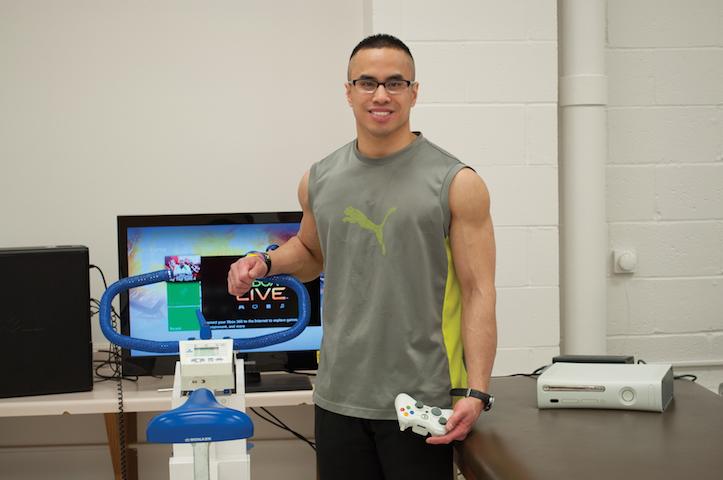UND researches benefits of video games
Study combines exercise with Xbox 360, music videos to battle obesity rates.
Graduate student Shawn Reich with research equipment. Photo by Shae Bonifacio/The Dakota Student.
In response to rising obesity rates in America, UND students and professors are researching the use of video games to enhance exercise.
Shawn Reich, a second year master student in kinesiology and a graduate research assistant in public health education, is one of the researchers. Reich started the study in February for his master’s thesis. He hopes to have results by late April or early May.
Sarah Edwards, assistant professor in the counseling psychology and community services department, and a research team are designing a similar study based on the use of video games which will be revealed next week.
“The obesity rates in America have gradually increased throughout the decades,” Reich said. “The Centers for Disease Control and Prevention estimates that approximately 35.7 percent and 17.5 percent of U.S. adults and children are obese. Physical health activity is a key health behavior in helping combat the obesity epidemic.”
Reich is looking for 24 sedentary to moderately active males ages 18-35 to participate in his study. The research is designed to examine if the use of technology, specifically video games, is a viable option to get sedentary to moderately active individuals more interested in exercising.
“My exclusion criteria include that you can’t be a varsity or college athlete or a highly fit individual because you’re more in tune with your body,” Reich said. “I’m just looking for people who may not get as much physical activity as they’d like. I will go on their availability, and participants who complete all sessions will be entered into a drawing for a $200 Best Buy gift card.”
The participants will be asked to cycle on an exercise bike for three 20-minute sessions. For one session, the participants will play Xbox 360 while cycling. In another, the participants will watch music videos. The last session will be without video game or music video accompaniment. During the three sessions, Reich will be looking for psychological and physical variables.
A similar study, titled “The Effects of Music and Video on Perceived Exertion and Performance of a Cycling Task at Vigorous Intensity” was done by Enoch Chow in 2012 at University of North Carolina in Greensboro.
In his study, Chow looked at the difference in attentional focus and perceived exertion during high-intensity exercise as a function of being exposed to music, video, both and nothing.
For those who were exposed to music and videos, Chow saw that the video entertainment helped participants perceive lower exertion rates, and increased their performances during activity.
“The implication of this finding is that due to the lower perceived exertion, an individual could engage longer in vigorous intensity exercise,” Chow said.
The combination of music and videos also contributed to participant’s positive feelings while engaged in the exercise which increased motivation, activity and overall health.
“Therefore, our findings have implications for all individuals and especially for populations who need to increase their exercise output, such as the hypertensive and the obese,” Chow said.
Reich hopes the information from his study will influence the UND Wellness Center to invest in machines that incorporate the use of video games and music videos.
Adele Kieger is a staff writer for The Dakota Student. She can be reached at adele.kieger@my.und.edu.












